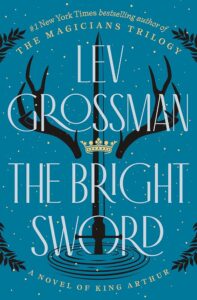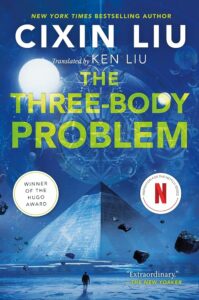 Cloud Cuckoo Land. Doerr. An imaginative story of five people spanning from the fall of Constantinople in the 1400s to the Korean War in the 1950s to present day Idaho to a generation starship in the 22nd century, all connected by a fictional lost Greek fantasy epic from the 2nd century. The novel opens with gusto as the short chapters bounce between these very different settings and it’s not clear at all how some of them will come together. Somewhere in the late middle that mystery is lost, even before being actually resolved, but the novel has shifted to an appealingly sweet paean to books and storytelling. Normally I’m viscerally opposed to self-congratulating media but it’s well done here, possibly because the stakes remain largely individual. Doerr stretches his oeuvre a bit in this work to science fiction and it shows: All the historical sections are very good but the lite sci-fi near future and far future segments are comparatively tepid and implausible, although they don’t bring the book down. The other storylines are infused with such good characters and the soft joy of story that it’s a great book.
Cloud Cuckoo Land. Doerr. An imaginative story of five people spanning from the fall of Constantinople in the 1400s to the Korean War in the 1950s to present day Idaho to a generation starship in the 22nd century, all connected by a fictional lost Greek fantasy epic from the 2nd century. The novel opens with gusto as the short chapters bounce between these very different settings and it’s not clear at all how some of them will come together. Somewhere in the late middle that mystery is lost, even before being actually resolved, but the novel has shifted to an appealingly sweet paean to books and storytelling. Normally I’m viscerally opposed to self-congratulating media but it’s well done here, possibly because the stakes remain largely individual. Doerr stretches his oeuvre a bit in this work to science fiction and it shows: All the historical sections are very good but the lite sci-fi near future and far future segments are comparatively tepid and implausible, although they don’t bring the book down. The other storylines are infused with such good characters and the soft joy of story that it’s a great book.
Category Archives: reviews
The Bright Sword
 The Bright Sword. Grossman. A story of Camelot following shortly after the death of Arthur. Grossman embraces the popular and modernized side of Arthurian fiction. Characters speak in a more or less modern tone, though without going so far with cliches and phrasings as to break the suspension of disbelief. History is jumbled around as necessary or desired, but again in discrete and traditional ways. For example, Sir Palomides is one of the main characters. He’s somehow a Muslim from Baghdad… before Muhammad was born and some centuries before Baghdad was founded. Yet this ahistoricity is well in line with Arthurian fiction—Palomides is traditionally labeled a Saracen, which in the time period would roughly mean a pagan from the Middle East but later came to be synonymous with Muslim—and definitely would not have bothered classic Arthurian authors. In any event, the modern tone and lack of fuss about strict historical accuracy facilitates a quick reading adventure story. Notably for this day and age, The Bright Sword is not intended to be the start of a series or anything like that. There’s a coherent story arc that comes to a definite conclusion with the important matters all wrapped up. Major themes include the basic Arthurian conflict between paganism and Christianity; what it means to believe you are fighting for (a) God and to credit your victories to them, only to then suffer catastrophic and final defeat; the migration of peoples and evolution of cultures and lands, in this case from the Old Ones to the Picts and Celts to the Romans to the Britons to the Saxons.
The Bright Sword. Grossman. A story of Camelot following shortly after the death of Arthur. Grossman embraces the popular and modernized side of Arthurian fiction. Characters speak in a more or less modern tone, though without going so far with cliches and phrasings as to break the suspension of disbelief. History is jumbled around as necessary or desired, but again in discrete and traditional ways. For example, Sir Palomides is one of the main characters. He’s somehow a Muslim from Baghdad… before Muhammad was born and some centuries before Baghdad was founded. Yet this ahistoricity is well in line with Arthurian fiction—Palomides is traditionally labeled a Saracen, which in the time period would roughly mean a pagan from the Middle East but later came to be synonymous with Muslim—and definitely would not have bothered classic Arthurian authors. In any event, the modern tone and lack of fuss about strict historical accuracy facilitates a quick reading adventure story. Notably for this day and age, The Bright Sword is not intended to be the start of a series or anything like that. There’s a coherent story arc that comes to a definite conclusion with the important matters all wrapped up. Major themes include the basic Arthurian conflict between paganism and Christianity; what it means to believe you are fighting for (a) God and to credit your victories to them, only to then suffer catastrophic and final defeat; the migration of peoples and evolution of cultures and lands, in this case from the Old Ones to the Picts and Celts to the Romans to the Britons to the Saxons.
The Three Body Problem
 The Three Body Problem. Liu. High concept science fiction about the search for extraterrestrial intelligence and the consequences thereof.
The Three Body Problem. Liu. High concept science fiction about the search for extraterrestrial intelligence and the consequences thereof.
Though massively hyped, this is a fairly bland novel. The first quarter or first third or so are interesting. From an American perspective it’s refreshing to have a story set in recent Chinese history, especially in the countryside, rather than modern-to-near-future urban cyberpunk, triads, and/or espionage. There is also a lot of nuance in that aspect, as the book is clearly critical of the Cultural Revolution and the Communist Party but also endorses basic tenets we would consider communist and even authoritarian. These sections of the book also have a number of potentially very interesting characters and relationships between them.
The later sections of the book though mostly shunt all that aside in favor of long expository monologues expounding on a combination of vaguely scientific ideas and the history of an alien race. Unfortunately we’re not given much reason to care about that race and the science-y mumbo jumbo is less than captivating. In some aspects the book reminds me of Andy Weir’s novels to date—The Martian, Project Hail Mary, Artemis—which range in that order from fine to meh to atrociously bad but all “feature” way too much made up technical greebling and science-y-ness. But even more so, The Three Body Problem feels like reading “golden age” science fiction from the ’40s & ’50s (roughly speaking), most of which is… not good. That literature similarly expends great time conducting lessons on various science concepts that are then stretched too far in application, almost always at the expense of character development. A lot of it also hinges on singular premises that ultimately just come across as silly. Specifically, The Three Body Problem feels very much like a Chinese version of Arthur C Clarke’s Childhood’s End, an ostensibly classic 1953 novel also about first contact that also has some interesting ideas but reads pretty flat and to my taste is overwhelmed by a mostly unnecessary but very goofy plot conceit.
All in all, I didn’t hate reading The Three Body Problem, but it’s definitely not on my recommended list and I’m not particularly motivated for the rest of the trilogy.
— Additional —
The Black Forest. Liu. Followup to The Three Body Problem that is a pretty good book almost despite itself. As with the prior book there is a lot of exposition and a number of digressions to include small science-y factoids. There are also several conceits you just have to accept, e.g., people collapsing like anime characters when presented with their foil. Finally, there’s a substantial “time is a flat circle” kind of plot element going on but unexplained. But I do like several threads and characters, though many of them don’t hardly interact at all. The Black Forest concept and denouement of the proximate threat to humanity is very good. The Wallfacer concept and the struggle to fight such an asymmetric conflict is interesting. Luo Ji’s story arc seems like it’s going deep into left field, but it comes back nicely in the end. Zhang Beihai comes across as a militarized Spock who can’t quite follow through on his cold logic and has a low key great ending. All in all, it still reads like “Golden Age” sci-fi, but compared to the prior book it’s arguably elevated to a higher tier of that class. The Black Forest doesn’t really have the humanity, texture, and uniqueness of the historical opening sections of The Three Body Problem. But the Foundation-style “grand trajectory of humanity” tale in The Black Forest is much better.
— Additional Additional —
Death’s End. Liu. Finale of the Three Body Problem trilogy. This novel doubles or maybe quadruples down on every negative I could lob at The Three Body Problem, making The Black Forest the definite high point of the series. Death’s End is an extremely high concept galactic history from the perspective of humans subsequent to the events of the prior two books. At one point there’s a time skip between chapters of eighteen million years… It is written and reads like a tepid popular history of a fictional nation. Entire chapters are purely expository walkthroughs of political and economic systems and history. What little characterization exists doesn’t add depth of interest. In addition, the men are all steely-eyed warriors of philosophy, science, and war, while the women are flighty and weak hangers-on. There’s a lot of narratorial speechifying about the feminization of society and the lack of collectivism, both of which lead directly to multiple catastrophic failures of humanity. Meanwhile, despite these books’ reputation as “hard sci-fi,” the physics weaved throughout the story has progressed to the point of absurd handwavium. Long story short, I persevered through the book to finish the trilogy and not be subject to (imaginary) rebuttals of not reading the whole series or just not getting it when I criticize The Three Body Problem. Once more the purpose of my life is to serve as a warning to others.